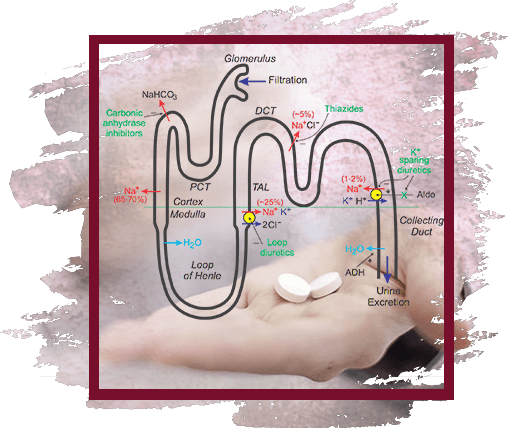
How do diuretics for weight loss work?

Often, when it is necessary to lose weight, overweight people use diuretics. How does a diuretic affect changes in body weight and health? Do I need to take diuretics?
Diuretics or diuretics work on the kidneys to help rid the body of excess water and salt. There are three classes of diuretics, they work in different ways, so taking diuretics alone is undesirable. The action of diuretics seems harmless, most people do not have information about the action of diuretics and even try to use them for weight loss. What you need to know about diuretics?
Probably, many people know the curious case of Viagra: originally this drug was intended to treat high blood pressure, but due to its interesting side effect, it began to be used, so to speak, not for its intended purpose. The same happened with diuretics: these funds were created for people suffering from diseases of the cardiovascular system, kidney or liver. After some time, diuretics became popular among athletes: as a result of the elimination of fluid from the body, not only did the weight decrease, but also the muscles became more prominent. Gradually, diuretics began to be used for weight loss and in everyday life.
However, the use of diuretics in order to get rid of extra pounds has both pros and cons. Let's make a reservation right away that our article is not about medicines, but about products based on natural natural ingredients: cranberries, rose hips, birch, plantain, etc. The use of medicinal diuretics is possible only according to indications and only after consulting a doctor, otherwise there is a high risk of side effects.
The main disadvantage of using diuretics for body shaping is that when they are used, the weight is reduced precisely due to the elimination of excess fluid, but fat deposits remain in place. In addition, the use of diuretics gives a short-term effect, since together with the replacement of the volume of fluid, the original weight will return. Stable long-term weight loss can be achieved by using the body's energy contained in its own fat reserves, i.e. increasing physical activity and / or reducing the calorie intake.
In an effort to correct weight with diuretics, remember also that water is a catalyst for all chemical reactions, that is, if there is not enough fluid in the body, then the breakdown of fats slows down. Thus, for proper weight loss, it is necessary to provide the body with a sufficient amount of fluid, but not remove it from the body.
Diuretics are commonly prescribed drugs
Diuretics are used to reduce swelling and excess fluid build-up, as well as to lower blood pressure. They are prescribed for hypertension, heart failure, edema of unknown origin.
If you want to lose weight or get rid of bloating, diuretics are not prescribed.
Diuretics are not addictive but can be dangerous
Diuretics are not habit-forming, but they can be harmful to the body, especially if taken without a doctor's prescription or taken in excess of the prescribed dosage. Diuretics lead to dehydration and worsen the condition of the kidneys, cause severe loss of electrolytes, on the basis of which weakness, dizziness, confusion, and increased heart rate develop.
A diuretic won't help you lose weight
The slimming effect that diuretics give is due to a decrease in swelling, a person feels less bloated. This effect is temporary, immediately after refusal to take the drug, the kidneys return to the previous mode of work, the body again retains water and electrolytes, and returns to its previous weight.
Diuretics may cause weight gain
Taking any diuretic for a long period of time will reverse the effect. The kidneys seek to compensate for the effect of the drug, the liquid begins to be excreted worse, the tissues accumulate water. In this regard, the body retains more fluid than it needs, the weight becomes more than before taking the diuretic.
Diuretics are prescribed for PMS
Healthy women do not need diuretics, but they are used to reduce symptoms of premenstrual syndrome. In painful PMS, diuretics can help reduce bloating, relieve swelling in the legs, and make you feel better, but they should only be taken as directed by a doctor.

Are diuretics effective for weight loss?
Many people are used to focusing solely on the number on the scales in this matter. This is fundamentally wrong, and diuretics are an example of this.
If a person who has neither obvious nor latent edema begins to use diuterics, then his body will really get rid of fluid. Weight will decrease, the skin and mucous membranes will become dry, cold, visually, it may even seem that he actually lost weight. However, this is not at all the case. We are talking about banal dehydration. In addition, if you use potassium-sparing diuretics, the body will lose vital potassium and other trace elements. This begins to affect the state of health quickly enough.
What does the uncontrolled intake of diuretics lead to?
The appointment of diuretics is a responsible task for the doctor. There is no traditional treatment regimen (for example, a pill 3 times a day). Usually, doctors select the required dose for several visits, titrate it, while assessing both the patient's subjective condition and his laboratory data. If the diagnosis forces you to prescribe potassium-sparing drugs, then potassium supplements (papangin, asparkam) are additionally included in the therapy to avoid its deficiency. For each patient, the prescriptions are strictly individual, depending on weight, pressure level, degree of fluid retention, taking concomitant medications, etc. How can a person without medical education find a safe dose of diuretics for themselves? No way. Self-administration, especially in the case of potassium-sparing diuretics, sometimes leads to very sad consequences. In addition to true dehydration, a person may experience the following symptoms and conditions: fainting, headache, dizziness, severe weakness as a result of a sharp drop in blood pressure (especially if the person is initially hypotonic); heart rhythm disturbances, interruptions, pain in the heart area due to the elimination of electrolytes; severe muscle weakness, cramps as a result of potassium excretion; drowsiness, apathy, flaccid paralysis as a result of the action of a deficiency of fluid and electrolytes on the nervous system; sudden cessation of urine excretion as a result of acute renal failure due to toxic renal damage; thrombosis of various vessels, thromboembolism, ischemic stroke or myocardial infarction.
The list of complications of uncontrolled diuretic use can be continued for a long time, but they are all extremely serious and require urgent medical attention.
 DE
DE FR
FR IT
IT ES
ES






